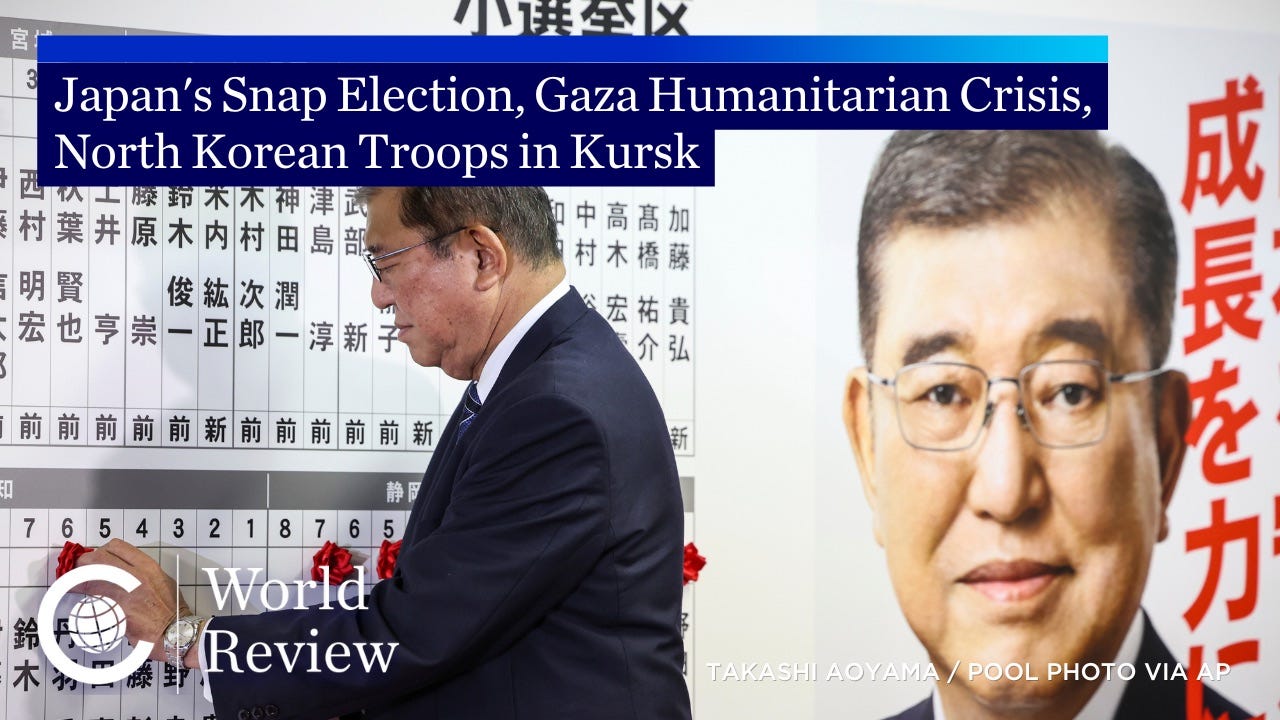World Review: Japan's Snap Election, Gaza Humanitarian Crisis, North Korean Troops in Kursk
A brief synopsis of this week's show
Each Friday morning, I host a video podcast called “World Review with Ivo Daalder” where three journalists from major news outlets around the world join me in discussing the latest global news stories of the week.
This morning, November 1, I was joined by Yasmeen Abutaleb of the Washington Post, Ken Mariyasu of Nikkei Asia, and Anton LaGuardia of The Economist.
“World Review is always fascinating. I love the fact that you can get journalists from around the world to participate since zoom is the medium.”
— A Subscriber to America Abroad
While I encourage you to watch or listen to the episode (and subscribe wherever you get your podcasts!), here are a few interesting things I took away from our discussion:
Japan’s snap election by newly installed Prime Minister Shigiru Ishiba backfired swiftly, as Ishiba’s party and coalition lost the absolute majority they had enjoyed for the past 15 years, throwing Japanese politics into uncertainty. It now looks like the centrist DPP, led by Yuichiru Tamaki, who Ken called the “Joe Manchin of Japanese politics,” will be the kingmaker in the new parliament and government. The DPP will likely support Ishiba—but at a price, which includes more money in Japanese people’s pockets and less deference to the United States. Political instability comes at a most inconvenient time for Japan … and for the United States. Like most everyone, Tokyo is eagerly awaiting the outcome of the US elections. While Shinto Abe had a good relationship with Donald Trump, Trump’s views of Japan have hardly improved in his four years out of office. It will take a strong Japan to work effectively with a new Trump administration. At the same time, Joe Biden has put a lot into the relationship with Japan, which has strengthened its position as America’s most important ally in Asia. A Harris administration would likely want to build on that to support its Indo-Pacific strategy, but whether it can when Japan is in political turmoil remains to be seen.
Earlier this week, the United States announced the surprise deployment of 10,000 North Korean troops to Russia—the first time Moscow welcomed foreign forces onto its territory in more than a century. The deployment raises a host of interesting questions, Anton suggested. In one sense, the deployment is the logical outflow of the strengthening bonds among the four countries that are now seen as a new “axis of autocracies.” Since Russia’s full-scale invasion of Ukraine in early 2022, Iran has supplied it with drones and perhaps missiles, China with weapons components and items to rebuild its defense industrial base, and North Korea with ammunition, missiles, and now troops. But in another sense, Moscow is now training Korean forces to fight—and die—as frontline troops on the battlefield, though inside Russia to counter Ukrainian forces that have entered the Kursk region rather than inside Ukraine itself. All of this poses real dilemmas for the United States, Europe, and China. In Washington, people are debating whether attacking North Korean troops with US weapons will escalate the war. In Europe, voices are again being raised about whether to deploy European troops to help Ukraine now that Russia has introduced foreign troops into the conflict. And in China, there are worries about a North Korea seemingly more interested in Russia than continuing to rely on China for its security.
While the situation inside Gaza no longer dominates the headlines as Israel’s fight with its neighbors has expanded north and east and America is consumed with the final days of its presidential campaign, the humanitarian situation inside Gaza is getting ever-more desperate. Last month saw the fewest aid-delivering trucks enter the Strip since the beginning of the year. Israel continues to strike targets, including hospitals, especially in the North. And there are growing concerns that Israel may be trying to create a buffer zone in the North by removing all civilians from the area, even though the 400,000 or so Gazans still there have no place to go. All of this raises the question, Yasmeen argued, of what the Biden administration will do after the election. Last month, Secretaries Blinken and Austin sent Israel a letter specifying the humanitarian and other steps it needs to take if the US is to certify that Israel still abides by international humanitarian law, which is a condition for the continued supply of arms. It gave Israel 30 days to respond—a timeframe that expires the middle of this month. So far, Israel has taken few if any of the steps the US sought. In fact, the Knesset just voted to ban UNRWA, the UN agency in charge of helping Palestinian refugees, a big step back from helping the people in need. Evidently, the Israeli government is now leaving the ball in Biden’s court.
That’s it for my quick takes of this week’s episode here on America Abroad. To get the full flavor, please listen to the episode itself.



